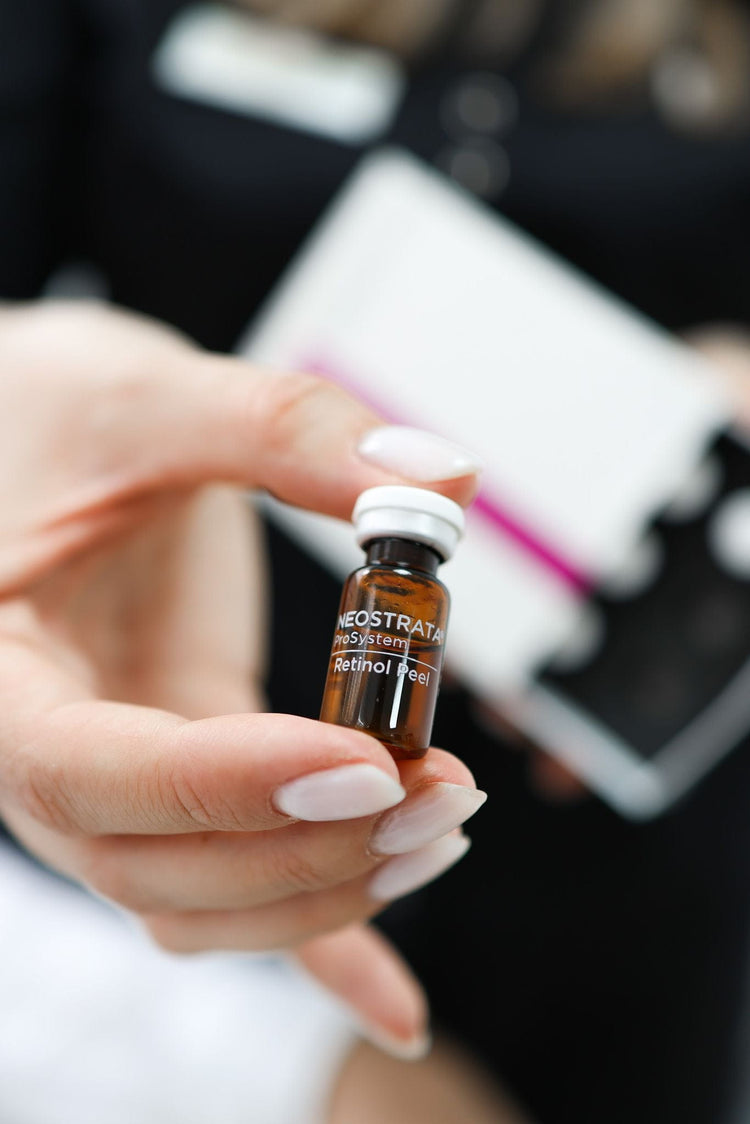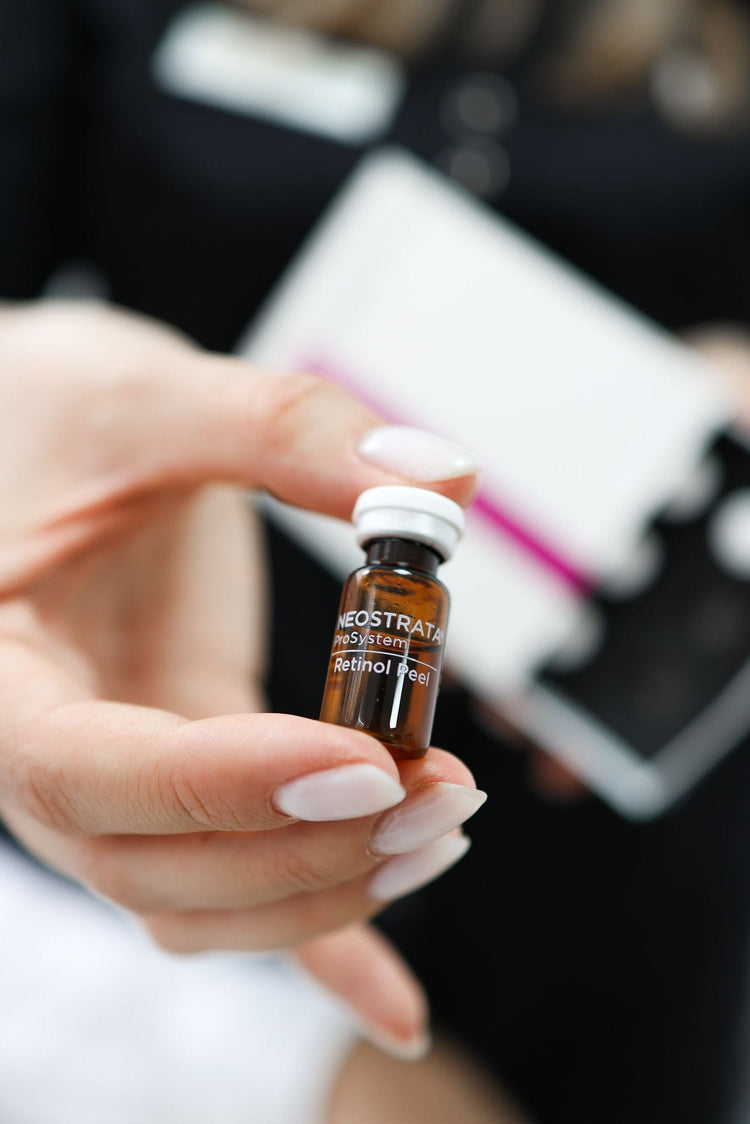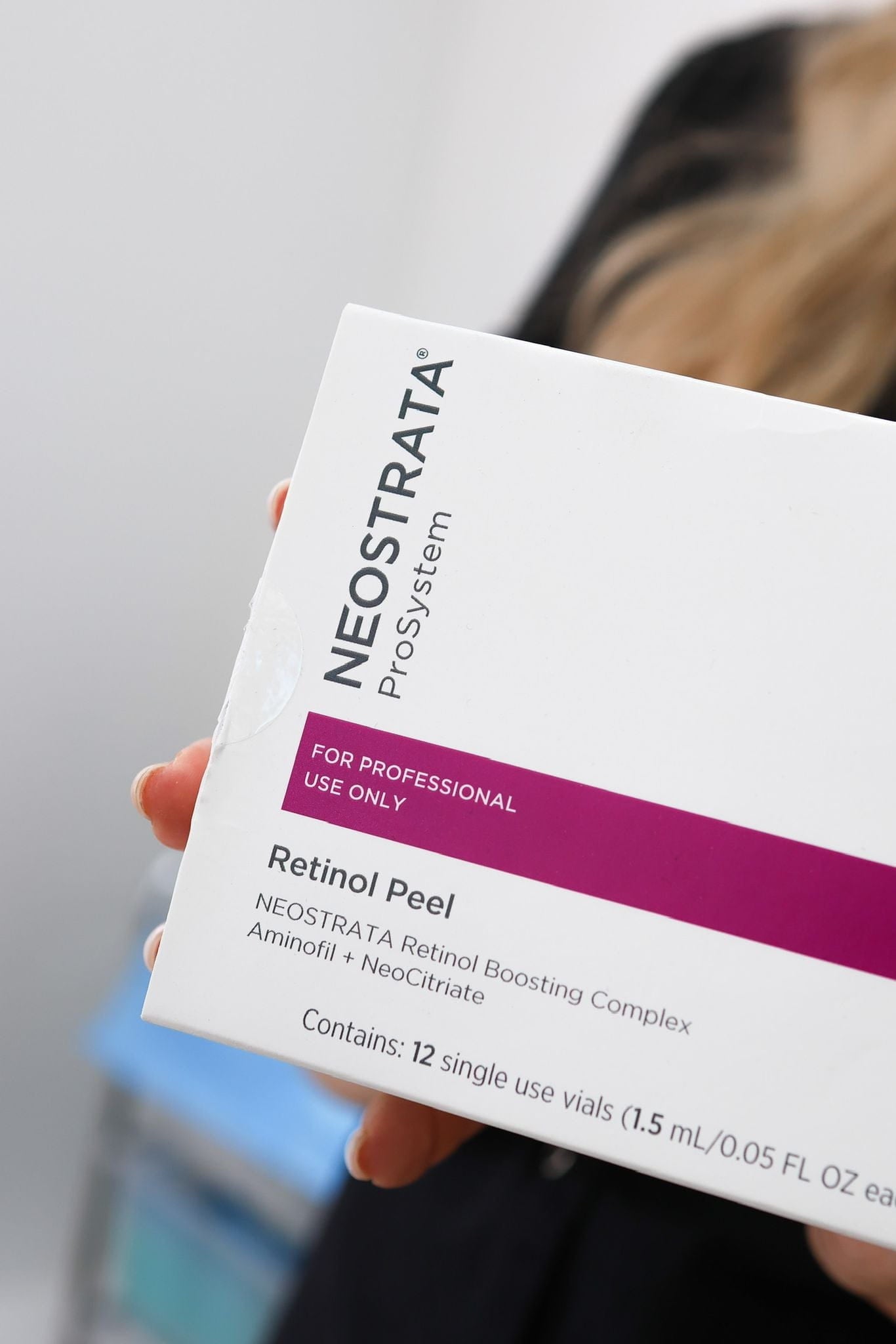Understanding Retinol Peels
Retinol, a potent derivative of vitamin A, has gained immense popularity for its skin-transforming benefits. Renowned for reducing wrinkles, minimizing pores, and improving skin texture, retinol has become a staple ingredient in various skincare products. However, the powerful nature of retinol can pose challenges for sensitive skin types, prompting questions about its safety and suitability for those with delicate complexions.
What is a Retinol Peel?
Retinol peels are chemical exfoliation treatments that utilize retinol to improve the appearance of skin. Unlike traditional chemical peels which use acids like glycolic or lactic acid, retinol peels rely on vitamin A derivatives to shed dead skin cells, stimulate collagen production, and reduce the signs of aging.
The concentration of retinol used in these peels can vary, with stronger formulations producing more dramatic results but also increasing the risk of irritation. Retinol peels are often recommended for those seeking improvements in fine lines, wrinkles, hyperpigmentation, acne scars, and uneven skin tone.
How Retinol Works on Skin
Whether retinol peels are safe for sensitive skin in Kingston Upon Thames or anywhere else depends on several factors. Retinol’s effectiveness stems from its ability to accelerate skin cell turnover, boosting collagen production and revealing brighter, smoother skin. However, this process can be irritating for those with sensitive skin, potentially causing redness, dryness, peeling, or even burning.
Individuals with sensitive skin should proceed cautiously with retinol peels, consulting a dermatologist experienced in treating sensitive complexions. A patch test is crucial to gauge individual skin tolerance before committing to a full-face treatment. Starting with a lower concentration of retinol and gradually increasing it as tolerated can also minimize the risk of irritation.
Benefits of Retinol Peels
Retinol, a potent derivative of vitamin A, has gained immense popularity for its skin-transforming benefits. Renowned for reducing wrinkles, minimizing pores, and improving skin texture, retinol has become a staple ingredient in various skincare products. However, the powerful nature of retinol can pose challenges for sensitive skin types, prompting questions about its safety and suitability for those with delicate complexions.
Retinol peels are chemical exfoliation treatments that utilize retinol to improve the appearance of skin. Unlike traditional chemical peels which use acids like glycolic or lactic acid, retinol peels rely on vitamin A derivatives to shed dead skin cells, stimulate collagen production, and reduce the signs of aging.
The concentration of retinol used in these peels can vary, with stronger formulations producing more dramatic results but also increasing the risk of irritation. Retinol peels are often recommended for those seeking improvements in fine lines, wrinkles, hyperpigmentation, acne scars, and uneven skin tone.
Whether retinol peels are safe for sensitive skin depends on several factors. Retinol’s effectiveness stems from its ability to accelerate skin cell turnover, boosting collagen production and revealing brighter, smoother skin. However, this process can be irritating for those with sensitive skin, potentially causing redness, dryness, peeling, or even burning.

Individuals with sensitive skin should proceed cautiously with retinol peels, consulting a dermatologist experienced in treating sensitive complexions. A patch test is crucial to gauge individual skin tolerance before committing to a full-face treatment. Starting with a lower concentration of retinol and gradually increasing it as tolerated can also minimize the risk of irritation.
Risks and Considerations for Sensitive Skin
Sensitive skin requires careful consideration when incorporating potent skincare ingredients like retinol. While retinol peels offer promising results in addressing various skin concerns, they can potentially trigger irritation or exacerbate existing sensitivities.
Sensitivity Reactions to Retinol
Individuals with sensitive skin should proceed cautiously with retinol peels and consult a dermatologist experienced in treating delicate complexions. A patch test is crucial to assess individual tolerance before undergoing a full-face treatment.
Starting with a lower concentration of retinol and gradually increasing it as tolerated can help minimize the risk of irritation. It’s essential to pay close attention to how the skin reacts during and after the peel, and discontinue use if any adverse effects occur.
Alternative treatments, such as gentle exfoliation methods or products containing milder retinoids, may be more suitable for sensitive skin types.
Potential Side Effects
Sensitive skin requires careful consideration when incorporating potent skincare ingredients like retinol. While retinol peels offer promising results in addressing various skin concerns, they can potentially trigger irritation or exacerbate existing sensitivities.
Individuals with sensitive skin should proceed cautiously with retinol peels and consult a dermatologist experienced in treating delicate complexions. A patch test is crucial to assess individual tolerance before undergoing a full-face treatment.
Starting with a lower concentration of retinol and gradually increasing it as tolerated can help minimize the risk of irritation. It’s essential to pay close attention to how the skin reacts during and after the peel, and discontinue use if any adverse effects occur.
Alternative treatments, such as gentle exfoliation methods or products containing milder retinoids, may be more suitable for sensitive skin types.
Contraindications for Retinol Peels
Sensitive skin requires careful consideration when incorporating potent skincare ingredients like retinol. While retinol peels offer promising results in addressing various skin concerns, they can potentially trigger irritation or exacerbate existing sensitivities.
Individuals with sensitive skin should proceed cautiously with retinol peels and consult a dermatologist experienced in treating delicate complexions. A patch test is crucial to assess individual tolerance before undergoing a full-face treatment.
Starting with a lower concentration of retinol and gradually increasing it as tolerated can help minimize the risk of irritation. It’s essential to pay close attention to how the skin reacts during and after the peel, and discontinue use if any adverse effects occur.
Alternative treatments, such as gentle exfoliation methods or products containing milder retinoids, may be more suitable for sensitive skin types.
Finding a Qualified Practitioner in Kingston Upon Thames
Finding a qualified practitioner in Kingston Upon Thames who specializes in sensitive skin is essential when considering retinol peels.
Importance of Experience
Experience plays a crucial role when choosing a practitioner for any cosmetic procedure, especially for those with sensitive skin. A dermatologist with extensive experience treating sensitive skin will have a deep understanding of the potential risks and benefits associated with retinol peels. They can assess your individual skin type, identify any underlying conditions, and tailor the treatment plan accordingly.
Look for practitioners who are board-certified dermatologists or estheticians with specialized training in chemical peels. Inquire about their experience with retinol peels and their track record of treating patients with sensitive skin. Reading online reviews and testimonials from previous patients can also provide valuable insights into the practitioner’s expertise and patient satisfaction.
During your consultation, don’t hesitate to ask detailed questions about the procedure, potential side effects, and aftercare instructions. A qualified practitioner will patiently answer your concerns and ensure you feel comfortable and confident with the treatment plan.
Consultation Process
Finding a qualified practitioner in Kingston Upon Thames who specializes in sensitive skin is essential when considering retinol peels.
Experience plays a crucial role when choosing a practitioner for any cosmetic procedure, especially for those with sensitive skin. A dermatologist with extensive experience treating sensitive skin will have a deep understanding of the potential risks and benefits associated with retinol peels. They can assess your individual skin type, identify any underlying conditions, and tailor the treatment plan accordingly.
Look for practitioners who are board-certified dermatologists or estheticians with specialized training in chemical peels. Inquire about their experience with retinol peels and their track record of treating patients with sensitive skin. Reading online reviews and testimonials from previous patients can also provide valuable insights into the practitioner’s expertise and patient satisfaction.
During your consultation, don’t hesitate to ask detailed questions about the procedure, potential side effects, and aftercare instructions. A qualified practitioner will patiently answer your concerns and ensure you feel comfortable and confident with the treatment plan.
Skin Type Assessment
Sensitive skin requires careful consideration when incorporating potent skincare ingredients like retinol. While retinol peels offer promising results in addressing various skin concerns, they can potentially trigger irritation or exacerbate existing sensitivities.

Individuals with sensitive skin should proceed cautiously with retinol peels and consult a dermatologist experienced in treating delicate complexions. A patch test is crucial to assess individual tolerance before undergoing a full-face treatment.

Starting with a lower concentration of retinol and gradually increasing it as tolerated can help minimize the risk of irritation. It’s essential to pay close attention to how the skin reacts during and after the peel, and discontinue use if any adverse effects occur.
Alternative treatments, such as gentle exfoliation methods or products containing milder retinoids, may be more suitable for sensitive skin types.
Finding a qualified practitioner in Kingston Upon Thames who specializes in sensitive skin is essential when considering retinol peels.
Experience plays a crucial role when choosing a practitioner for any cosmetic procedure, especially for those with sensitive skin. A dermatologist with extensive experience treating sensitive skin will have a deep understanding of the potential risks and benefits associated with retinol peels. They can assess your individual skin type, identify any underlying conditions, and tailor the treatment plan accordingly.
Look for practitioners who are board-certified dermatologists or estheticians with specialized training in chemical peels. Inquire about their experience with retinol peels and their track record of treating patients with sensitive skin. Reading online reviews and testimonials from previous patients can also provide valuable insights into the practitioner’s expertise and patient satisfaction.
During your consultation, don’t hesitate to ask detailed questions about the procedure, potential side effects, and aftercare instructions. A qualified practitioner will patiently answer your concerns and ensure you feel comfortable and confident with the treatment plan.
Safety Precautions and Aftercare
Retinol peels, while effective for many, require careful consideration for those with sensitive skin. It is crucial to understand potential side effects like redness, dryness, peeling, or burning.
Consulting a dermatologist experienced in treating sensitive skin is essential before undergoing a retinol peel. They can assess your skin type and recommend a personalized treatment plan, including patch testing to gauge your tolerance.
Preparation Before the Peel
Retinol peels, while effective for many, require careful consideration for those with sensitive skin. It is crucial to understand potential side effects like redness, dryness, peeling, or burning.
Consulting a dermatologist experienced in treating sensitive skin is essential before undergoing a retinol peel. They can assess your skin type and recommend a personalized treatment plan, including patch testing to gauge your tolerance.
Before undergoing a retinol peel, it’s important to prepare your skin properly. This may involve avoiding certain skincare products, such as harsh exfoliants or retinoids, for several days leading up to the treatment.
It’s also essential to protect your skin from the sun by wearing sunscreen daily with an SPF of 30 or higher, both before and after the peel.
Aftercare is crucial for optimal results and minimizing potential side effects. Your dermatologist will provide specific instructions, but generally, this includes avoiding harsh cleansers, scrubbing, or picking at your skin.
It’s important to moisturize regularly with a gentle, hypoallergenic product. Continue using sunscreen diligently as your skin heals.
Post-Peel Care Instructions
Retinol peels, while effective for many, require careful consideration for those with sensitive skin. It is crucial to understand potential side effects like redness, dryness, peeling, or burning.
Consulting a dermatologist experienced in treating sensitive skin is essential before undergoing a retinol peel. They can assess your skin type and recommend a personalized treatment plan, including patch testing to gauge your tolerance.
Before undergoing a retinol peel, it’s important to prepare your skin properly. This may involve avoiding certain skincare products, such as harsh exfoliants or retinoids, for several days leading up to the treatment.
It’s also essential to protect your skin from the sun by wearing sunscreen daily with an SPF of 30 or higher, both before and after the peel.
Aftercare is crucial for optimal results and minimizing potential side effects. Your dermatologist will provide specific instructions, but generally, this includes avoiding harsh cleansers, scrubbing, or picking at your skin.
It’s important to moisturize regularly with a gentle, hypoallergenic product. Continue using sunscreen diligently as your skin heals.
Sun Protection
Retinol peels, while effective for many, require careful consideration for those with sensitive skin. It is crucial to understand potential side effects like redness, dryness, peeling, or burning.
Consulting a dermatologist experienced in treating sensitive skin is essential before undergoing a retinol peel. They can assess your skin type and recommend a personalized treatment plan, including patch testing to gauge your tolerance.
Before undergoing a retinol peel, it’s important to prepare your skin properly. This may involve avoiding certain skincare products, such as harsh exfoliants or retinoids, for several days leading up to the treatment.
It’s also essential to protect your skin from the sun by wearing sunscreen daily with an SPF of 30 or higher, both before and after the peel.
Aftercare is crucial for optimal results and minimizing potential side effects. Your dermatologist will provide specific instructions, but generally, this includes avoiding harsh cleansers, scrubbing, or picking at your skin.
It’s important to moisturize regularly with a gentle, hypoallergenic product. Continue using sunscreen diligently as your skin heals.
Learn more about Retinol Peels and their benefits at It’s Me & You Clinic with Dr. Laura Geige.
- Dermal Fillers Near Addington, Surrey - September 22, 2025
- Chin Crease Filler In Cheam, Surrey - September 20, 2025
- Cannabis Infused Cola: What It’s Really Like - September 19, 2025
